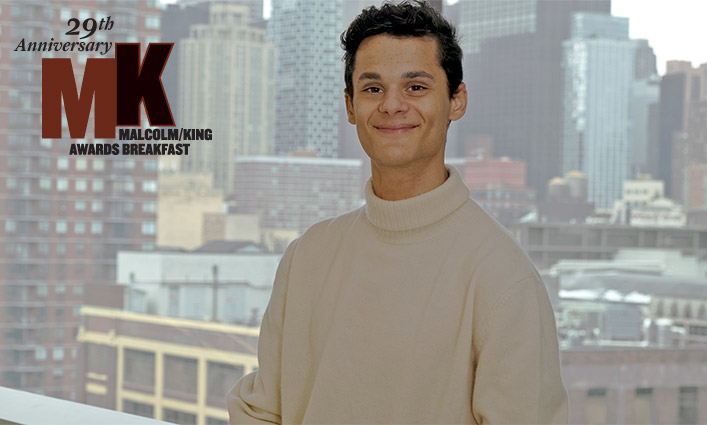
To continue our celebration of Black History month, and in anticipation of our 29th Malcolm/King Awards Breakfast, we spoke with the recipients of the Malcolm/King Award. Their success serves as an inspiration to students of all races, and their deep understanding and appreciation of African-American history is a testament to the many contributions African-Americans have made to this country. Our next “Malcolm/King Award Spotlight” is Dillon Epperson, a senior majoring in International Criminal Justice.
February is Black History Month. What does it mean to you to celebrate the many achievements African-Americans have contributed to this country?
Black History Month is all about remembering our history and paying homage to those that came before us. It's incredibly crucial to remember their struggle. We need to be consciously aware of our history, our roots, and how far we have come.
What goals do you have for advancing equality and fairness for all people, especially African-Americans?
I would like to create greater accessibility to education programs where different groups can come together. A lot of the issues surrounding racism, colorism, and misogyny, stems from a lack of education or a lack of exposure to a particular population. If you bring these different groups together, you create a space where dialogue, education, and cultural exchanges can take place. When people understand each other, it leads to acceptance, respect, and peace.
“When people understand each other, it leads to acceptance, respect, and peace.” —Dillon Epperson
When you think of African-American history, what makes you the proudest?
What makes me the proudest, is our first African-American president, Barack Obama. His win was obviously an historic one, but for me, as a biracial kid, his being biracial was what really stood out. I was in the fourth grade when he first ran. I remember seeing him and knowing that I had someone to look up to. Just to have a biracial figure in the political arena who represents someone like me and have him lead the nation, that was inspiring.
If you could talk to Malcolm X or Dr. Martin Luther King, Jr., what would you say to them?
I would ask them, how did they do it? How were they able to deal with people who had an unwavering mindset? What steps did they take to make sure that there was progression towards acceptance rather than just increasing tolerance. At that time, many people didn’t want to hear what they had to say, and yet they were able to break through and get their point across to so many. They faced so much resistance, and yet kept moving forward with their messages.
“Winning this scholarship is a dedication to my father who always took care of me, helped me with my homework, and taught me the sense of humor that I have today.”—Dillon Epperson
Dr. King once famously said, “Let us realize the arc of the moral universe is long, but it bends toward justice.” As a student at a school focused on justice, what does that quote mean to you?
I think he means, that in the end, the truth will always be told. It actually reminds me of a line I heard in a DJ Koze song. It goes “a lie is sweet in the beginning and bitter in the end, and truth is bitter in the beginning, and sweet in the end.” In the end, the moral arc of justice will always bend towards the truth.
What does it mean to you to receive the Malcolm/King Award?
It's a testament to my father who is African-American. He was a stay-at-home dad. In my household the roles were reversed, so my father raised me, while my mom worked. She worked really long hours, leaving at six in the morning and returning home at 10 at night, so I barely saw her, but my father was a constant presence. He was really the person that took care of me, my twin sister, and my older brother. Winning this scholarship is a dedication to my father who always took care of me, helped me with my homework, and taught me the sense of humor that I have today. He shaped who I am.
If everything goes according to plan, where do you see yourself in 10 years?
In 10 years, I see myself enrolled or already graduated from a Ph.D. program. Ideally, I would be focusing on higher education with a concentration on mass incarceration and correctional education.



